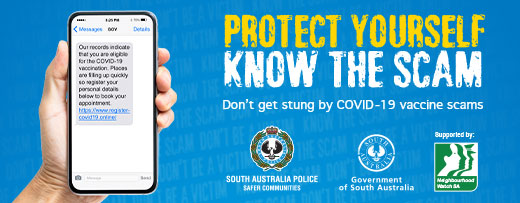COVID-19 vaccination scams

Cybercriminals are constantly evolving their tactics; tailoring their means and methods to current world events. As the COVID-19 vaccination is rolled out across South Australia, we’re anticipating that scammers will use this opportunity to send out fraudulent offers, designed to steal your identity.
It is important to remember that the COVID-19 vaccination is FREE.
We predict that scammers will seek to exploit people by offering – for a fee – early access to the vaccine or to be part of a clinical trial. There could be other approaches they come up with too.
Scammers often send emails and SMS messages claiming to be from legitimate sources. These messages may contain links or attachments that will take you to a fake website which asks for personal information and / or payment to ensure you receive a vaccine.
If you receive something like this please be alert and watch out for these warning signs:
- COVID-19 vaccine advertisements received via social media platforms, emails and telephone calls.
- Requests asking you to pay to put your name on a COVID-19 vaccine waiting list.
- Offers to undergo medical testing or procedures before obtaining a vaccine.
- Offers to sell or ship doses of a vaccine in exchange for payment of a deposit.
- Emails, telephone calls, or personal contact from someone asking you to participate in vaccine trials.
If you see any of those warning signs make sure you:
- Check the spelling of web and email addresses to ensure they are legitimate.
- Do not respond to, or open emails, attachments, or links from unknown sources.
- Be aware that fraudulent emails requesting your personal information may appear to be legitimate, even though they are not.
- Never trust the caller ID as scammers can manipulate the number to make phone calls and SMS messages appear as though they originate from legitimate sources, when they are not.
- If in doubt, hang up the phone and call the person or organisation back on a known, reputable number.
Remember, legitimate organisations would never ask for your sensitive information via an email or SMS. Be aware of what you share – don’t give out personal details such as medical details, date of birth, credit card or bank details unless you have confirmed the source and the need for the information. Don’t be pressured into making a decision.
Visit www.sahealth.sa.gov.au for up-to-date information about authorised vaccine distribution channels.
To learn how to protect yourself, visit www.police.sa.gov.au/scams.